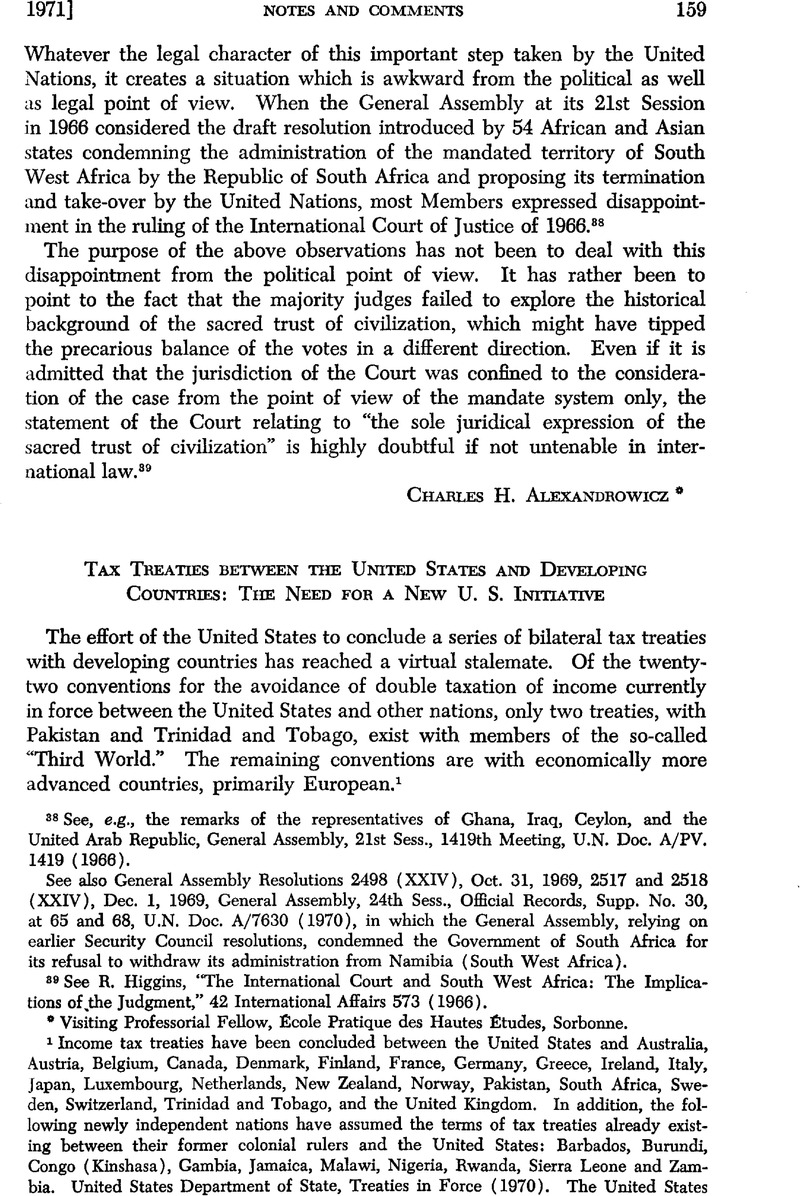Published online by Cambridge University Press: 28 March 2017

1 Income tax treaties have been concluded between the United States and Australia, Austria, Belgium, Canada, Denmark, Finland, France, Germany, Greece, Ireland, Italy, Japan, Luxembourg, Netherlands, New Zealand, Norway, Pakistan, South Africa, Sweden, Switzerland, Trinidad and Tobago, and the United Kingdom. In addition, the following newly independent nations have assumed the terms of tax treaties already existing between their former colonial rulers and the United States: Barbados, Burundi, Congo (Kinshasa), Gambia, Jamaica, Malawi, Nigeria, Rwanda, Sierra Leone and Zambia. United States Department of State, Treaties in Force (1970). The United States concluded a tax treaty with Honduras in 1957. The treaty was terminated by Honduras as of December 31, 1966. Instruments of ratification of the treaty with Trinidad and Tobago were exchanged at Port of Spain on Dec. 30, 1970. It is very doubtful that this agreement will serve as a model for future U. S. treaties with developing countries. The agreement omits any measure designed to promote investments of U. S. capital, such as a tax–sparing credit or investment credit. The Trinidad and Tobago Government argued strongly for such a provision, but agreed to forgo its demands for the time being, pending further negotiations after ratification of the basic treaty.
2 Sweden has treaties with Argentina, Brazil, Ceylon, India, Israel, Liberia, Morocco, Pakistan, Peru, Singapore, Thailand, Tunisia and the United Arab Republic. Norr, Martin, Sandels, Claes and Hornhammar, Nils G., The Tax System in Sweden 54 (1969)Google Scholar.
3 Japan has treaties with Pakistan, India, Singapore, Thailand, Malaysia, Brazil, Ceylon and the United Arab Republic. Tax Bureau, Japanese Ministry of Finance, An Outline of Japanese Taxes 203–204 (1969).
4 110 Cong. Rec. 16091 (1964).
5 United Nations Department of Economic and Social Affairs, Tax Treaties between Developed and Developing Countries, U.N. Doc. E/4614/ST/ECA/110 (1969).
6 Economic and Social Council Res. 1273 (XLIII), Economic and Social Council, 43d Sess., Official Records, Supp. No. 1 (E/4429), p. 5.
7 Organization for Economic Co-operation and Development, Draft Double Taxation Convention on Income and Capital (1963), OECD Doc. C (63) 87 (1967).
8 The study, prepared by the Secretariat with the assistance of consultants from outside the United Nations, is printed as part of the U.N. Doc. E/4614/ST/ECA/110, p. 33 et seq.
9 Treasury Release K–277.
10 See Stanley Surrey, S., “Tax Incentives as a Device for Implementing Government Policy: A Comparison with Direct Government Expenditures,” 83 Harvard Law Review 705 (1970)CrossRefGoogle Scholar.
11 The West German Development Aid Tax Law, for example, grants concessions to German exporters of finished and semi–finished goods to developing countries, even though the effect may be to impair the competitive ability of producers of such goods located within the developing countries. von Boetticher, Dietrich, “A New Approach to Taxation of Investments in Less Developed Countries,” 17 A. J. Comp. Law 529, 557 (1969)CrossRefGoogle Scholar.
12 See Norr, Martin, “Less Developed Country Treaties,” in Practising Law Institute, U. S. Taxation of Foreign Operations 161, 164 (1968)Google Scholar.